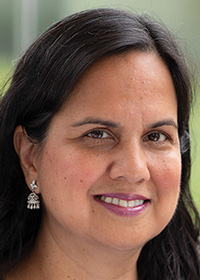Moving health care beyond ‘what’s the matter with you?’
by March 31, 2025 12:36 pm 488 views

At the heart of Alice L. Walton School of Medicine’s approach to creating the physicians of the future is training doctors in whole health principles. Whole health is defined by the National Institutes of Health as “physical, behavioral, spiritual, and socioeconomic well-being as defined by individuals, families and communities.”
This model encourages health care providers to consider the life circumstances and systems of care around each patient, including home environment, financial situation, relationships, and prior health care experiences. Whole health reframes the question from “what’s the matter with you?” to “what matters to you?” and engages the patient in sharing details about their life, values, and goals outside of what brought them to the clinic. It requires strong communication skills from us to build trust with the patient, and AWSOM is taking advantage of our location on the Crystal Bridges campus by incorporating art into the curriculum.
Studies have shown that art-based training helps develop deeper empathy — this goes hand-in-hand with the whole health approach. Here are some examples of what this approach can look like.
Empathetic viewpoint — we’re all patients at some point, whether we are caring for ourselves or helping a loved one receive care. We encourage students to reflect on their own experiences. When you were a patient, what were your immediate needs? What was confusing or distressing to you? What would have made a difference? These questions help them to step into a patient’s shoes.

Overall well-being — looking beyond problem-based care to promote preventative care and healthier lifestyles. Students will study conditions from a comprehensive viewpoint, learning how to fix the issue in addition to how it evolved and how it can be prevented.
Collaboration and communication — health is determined by many factors outside of a doctor’s office, and successful care acknowledges these unique circumstances. This means working closely with the patient, along with additional health care practitioners or ancillary figures such as community leaders, to deliver an individualized health plan. This empowers patients to take an active role in their care.
Seeing the big picture — understanding the health care systems, processes, and policies that impact every patient and provider. Our students will hone their leadership skills to not only effectively work within these systems but to improve them.
Health starts with you — in order to take good care of someone else, you have to be well yourself. The medical school feels strongly about providing the same quality of care and support to our students, equipping them to care for themselves too.
However, the approach of individual care providers is only one half of the story. A whole health approach is most compatible with a value-based care system. Value-based care focuses on patient outcomes and the quality of care as opposed to the traditional “fee-for-service” model, where providers are paid based on the quantity of services provided.
Mercy, the medical school’s primary educational partner, practices a value-based care model. Through early clinical experiences with Mercy, students will learn foundational pieces of putting the whole health approach into action within a value-based care model. Our hope is that through these unique educational opportunities and curriculum, AWSOM students will be prepared to provide the pinnacle of care for their future patients.
Editor’s note: Dr. Sharmila Makhija is the founding dean and CEO of Alice L. Walton School of Medicine, a medical school opening in Bentonville in July 2025. The opinions expressed are those of the author.
